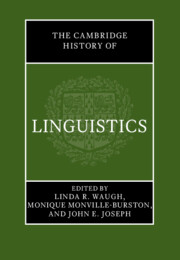Book contents
- The Cambridge History of Linguistics
- The Cambridge History of Linguistics
- Copyright page
- Dedication
- Contents
- Figures
- Tables
- Contributors
- Preface
- Acknowledgments
- Abbreviations, Acronyms, Special Symbols, and Other Conventions
- Introduction
- Part I Ancient, Classical, and Medieval Periods
- Introduction To Part I The Emergence of Linguistic Thinking within Premodern Cultural Practices
- 1 Ancient Near Eastern Linguistic Traditions: Mesopotamia, Egypt
- 2 East Asian Early Linguistic Traditions: China; Korea and Japan
- 3 History of Linguistic Analysis in the Sanskrit Tradition in Premodern India, with a Brief Discussion of Vernacular Grammars
- 4 Greek Linguistic Thought and its Roman Reception
- 5 Early to Late Medieval Europe
- 6 Near Eastern Linguistic Traditions
- 6A The Syriac Linguistic Tradition
- 6B The Hebrew Linguistic Tradition
- 6C The Arabic Linguistic Tradition
- Part II Renaissance to Late Nineteenth Century
- Part III Late Nineteenth-through Twentieth-Century Linguistics
- Part IIIA Late Nineteenth Century through the 1950s: Synchrony, Autonomy, and Structuralism
- Part IIIB 1960–2000: Formalism, Cognitivism, Language Use and Function, Interdisciplinarity
- References
- Index
Introduction To Part I - The Emergence of Linguistic Thinking within Premodern Cultural Practices
from Part I - Ancient, Classical, and Medieval Periods
Published online by Cambridge University Press: 20 July 2023
- The Cambridge History of Linguistics
- The Cambridge History of Linguistics
- Copyright page
- Dedication
- Contents
- Figures
- Tables
- Contributors
- Preface
- Acknowledgments
- Abbreviations, Acronyms, Special Symbols, and Other Conventions
- Introduction
- Part I Ancient, Classical, and Medieval Periods
- Introduction To Part I The Emergence of Linguistic Thinking within Premodern Cultural Practices
- 1 Ancient Near Eastern Linguistic Traditions: Mesopotamia, Egypt
- 2 East Asian Early Linguistic Traditions: China; Korea and Japan
- 3 History of Linguistic Analysis in the Sanskrit Tradition in Premodern India, with a Brief Discussion of Vernacular Grammars
- 4 Greek Linguistic Thought and its Roman Reception
- 5 Early to Late Medieval Europe
- 6 Near Eastern Linguistic Traditions
- 6A The Syriac Linguistic Tradition
- 6B The Hebrew Linguistic Tradition
- 6C The Arabic Linguistic Tradition
- Part II Renaissance to Late Nineteenth Century
- Part III Late Nineteenth-through Twentieth-Century Linguistics
- Part IIIA Late Nineteenth Century through the 1950s: Synchrony, Autonomy, and Structuralism
- Part IIIB 1960–2000: Formalism, Cognitivism, Language Use and Function, Interdisciplinarity
- References
- Index
Summary
In premodern traditions, the science of language was embedded in other sociocultural practices. Ancient writing prompted linguistic thinking such that literacy and grammar were intertwined and the ‘grammarian’ was an important cultural figure. The Greeks believed that philosophy was the best discipline for understanding language. In all premodern traditions, commentary discourse was central in the shaping of reflection on language. Commentary threads supplemented and/or corrected the original texts (scripture and grammars). A paramount aim was to maintain/explain the language of the sacred texts (Vedas, Qur’an, Vulgate). In their quest for purity grammarians developed the ideals of hellenismos, latinitas, and „arabiyya, thus imposing literate standards that created multilingual/diglossic situations.The issue of the separation of disciplines is reflected in grammarians’ discourses. Greek rationalism influenced Arabic grammar and, later, medieval language studies. Grammar was to be separate from theology, but the boundary between grammar and logic was controversial. While translations of the Qur’an were prohibited, the Christian Bible was translated (Greek, Hebrew to Latin). But the merit of vernacular scripture translation — which challenged the authority of Latin — was debated. Translations stimulated linguistic thinking and language contact produced creative mixed forms.
Keywords
- Type
- Chapter
- Information
- The Cambridge History of Linguistics , pp. 9 - 34Publisher: Cambridge University PressPrint publication year: 2023

